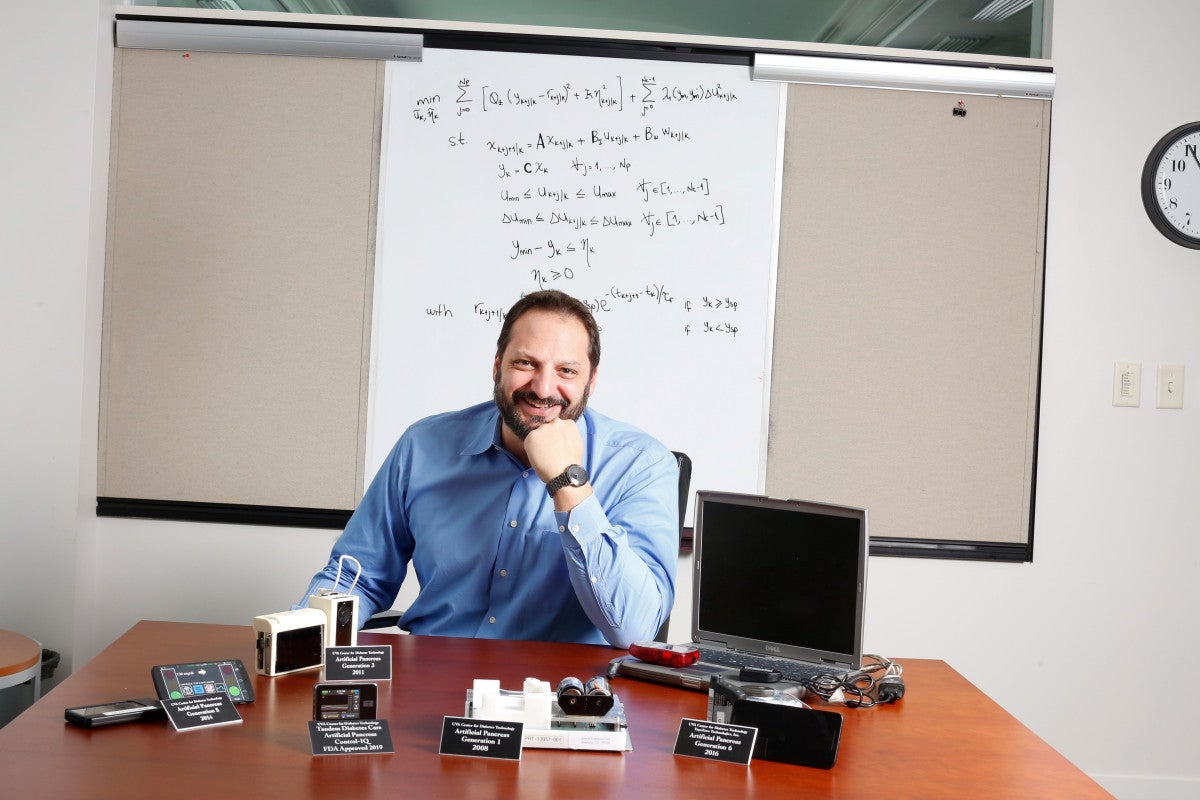
Marc Breton, an associate professor of psychiatry and neurobehavioral sciences at the University of Virginia School of Medicine and co-founder and associate director of research of the UVA Center for Diabetes Technology, has been selected as the 2022 Edlich-Henderson Innovator of the Year by UVA. The endowed award recognizes University faculty members whose work is making a major impact on society. This is the fifth year in a row that a faculty member from the School of Medicine has won this award.
A native of France who received his Ph.D. in systems engineering from UVA in 2004, Breton helped create the first, and to date only, simulation environment accepted by the U.S. Food & Drug Administration as a replacement for animal studies in pre-clinical assessment of insulin treatment. It paved the way for Breton and colleagues from the Center for Diabetes Technology, including 2011 Innovator of the Year Boris Kovatchev, to develop an artificial pancreas that has completely revolutionized the treatment of Type 1 diabetes, dramatically changing how people take care of themselves and what they are able to achieve.
The artificial pancreas project epitomizes UVA’s commitment to biotechnology and its promise of saving and improving lives. UVA recently announced plans to launch the Paul and Diane Manning Institute of Biotechnology, which will transform health care in Virginia and beyond with its focus on biotechnology research and development of modern treatments and cures for disease. The Mannings were early funders of the artificial pancreas.
“We live in a time of exciting possibility in health care, with new treatments showing great promise to help patients and their families,” UVA President Jim Ryan said. “UVA is right on the front lines of this work, and this recognition for Marc Breton is well-deserved. I’m grateful to him and his colleagues for what they have done to improve the lives of so many who are suffering from disease, including diabetes.”
The artificial pancreas system, known commercially as the t:slim X2 insulin pump with Control-IQ (Tandem Diabetes Care Inc., San Diego), consists of a continuous glucose sensor on the skin and an insulin pump. It is programmed with an algorithm that monitors and automatically regulates patients’ glucose levels, much like a healthy pancreas would.
In 2016, UVA’s Licensing & Ventures Group made the first-ever investment from the University’s Seed Fund in TypeZero Technologies, a startup company Breton cofounded. Two years later, TypeZero was purchased by DexCom Inc., the leader in glucose monitoring for people with diabetes.
Today, Breton’s work continues to improve the lives of people with diabetes around the world.
“Our little algorithm is now probably in 400,000 devices around the world, controlling the insulin of 400,000 people from the age of 2 to 98 years old,” Breton said, “and that’s incredibly special, because I had the opportunity to meet many of these people and hear how this work has impacted their lives. That has been an incredible high.”
Following the creation of the simulator and the artificial pancreas, Breton helped develop another algorithm that could be used for the precise estimation of hemoglobin A1C, a key indicator of long-term glucose control. The algorithm was implemented into the first commercial blood glucose monitoring device, called MyStar Extra, which supports insulin therapy management.
“Marc has a unique ability to see, compartmentalize and solve problems,” said Kovatchev, the co-founder and director of the Center for Diabetes Technology. “This is a rare combination, and it drove him to this success.”
Overall, Breton has submitted 55 invention disclosures to LVG since 2007, and he is a named inventor on 27 issued U.S. patents.
“Dr. Breton is one of the University’s most successful inventors, and the technologies he has developed throughout his career have saved and improved countless lives,” UVA Vice President for Research Melur K. Ramasubramanian said.
UVA LVG Executive Director Richard W. Chylla added: “Here at UVA LVG, our mission is to grow and guide University innovations, but equally important is to make a positive impact on society at large. If you look at the total return on Dr. Breton’s work at UVA – the lives of patients improved, the jobs created, the continuing sponsored research and the royalties back to the University for research reinvestment – it is a testament to this mission. Marc’s work deserves this recognition, and we are proud to celebrate him.”
LVG’s 30th annual Innovator of the Year event will take place Feb. 16, from 3:30 to 6 p.m., at the Rotunda. It will include a talk from Breton and a reception afterward. It is open to all UVA faculty, staff, students and community members. Click here to register.
Article was originally published on UVA Licensing & Ventures Group website.
Filed Under: Faculty, Honors & Awards
